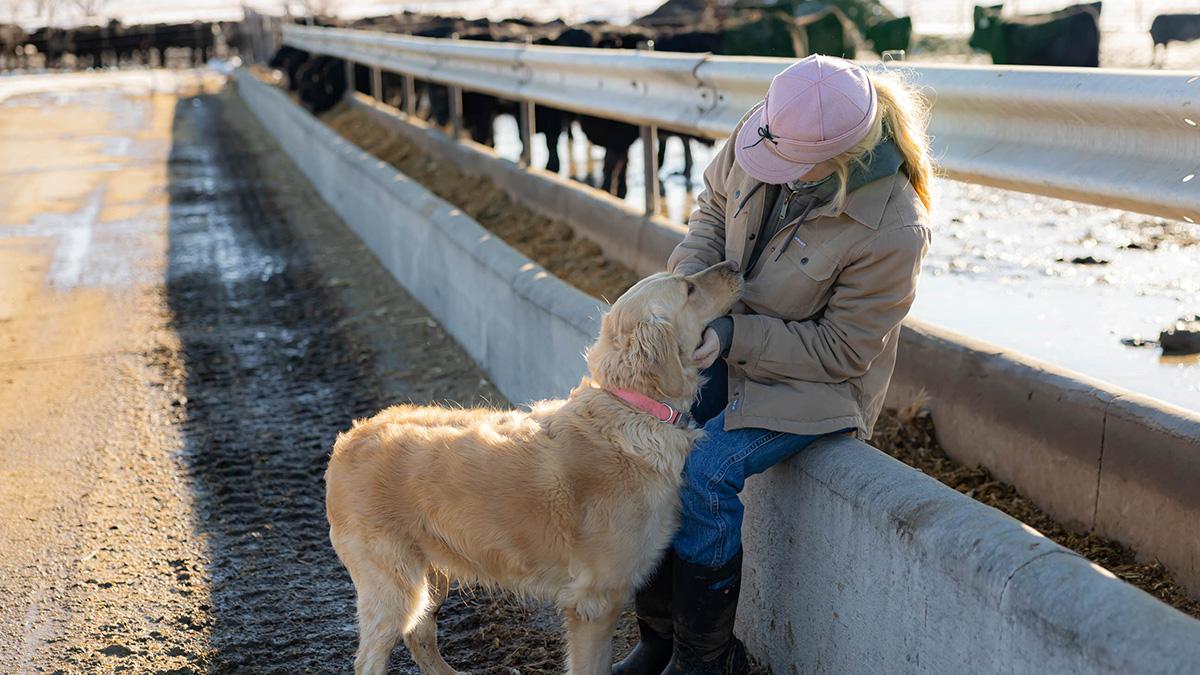Hannah Borg/Real Ag Stock
This article was first published on May 1, 2023, in the University of Nebraska-Lincoln's BeefWatch newsletter.
The weather impacts producers right and left. A storm can come up suddenly and be short-term, whereas a drought can build and persist long-term. Stress can be similar in nature. We can have acute, stressful moments when we get into town too late to pick up that important part to fix equipment before chores the next day. Stress can become chronic when one bad thing happens after the other. Many have experienced the effects of drought, first with not enough rain for pasture and forage production, leaving us short and having to spend extra money to find additional hay or forage. While we cannot control or manage the weather, we can learn strategies to keep our stress in check and reduce the effects that stress can have on us over the long haul.
Stress isn’t always bad. Sometimes good stress, called eustress, energizes us. Eustress might be what keeps us going during calving season or harvest. On the other hand, stress caused by negative factors perceived as burdensome or threatening and lingers, can lead to distress. Stress that just doesn’t seem to lighten up and becomes chronic can result in severe physical problems, emotional problems, or both. It is important to be self-aware and recognize when we are stressed and when it’s something we can’t shake without consciously taking steps to manage our stress better. In addition, being observant and helping those we work with regularly on our farm or ranch, including our loved ones that may seem constantly stressed, is important.
Learning some coping strategies or tools can help. What tools are we already using to help cope with stress and are they helpful or harmful? Strategies such as eating or drinking too much or eating too little can harm our overall health. Here are some examples of strategies that may help:
- Eating healthy, including more fruits and vegetables, and healthy snacks in the diet.
- Getting seven to eight hours of restful sleep each night.
- Listening to relaxing music.
- Volunteering to help with a worthy cause.
- Jotting down three things you are grateful for daily.
- Spending time playing games with family members.
- Spending time with a pet.
- Not letting the farm or ranch operation intrude on all other aspects of life.
- Reading something new every day.
- Letting go of what cannot be controlled.
Additional helpful strategies can be found on the webpage by North Dakota State University, “My Coping Strategies Plan – At Home and on the Farm.”
While there is no “one size fits all” method for coping with stress, working to improve our health and well-being by addressing eight dimensions of wellness (Ponte, K., “Ways to Manage and Cope with Stress.” National Alliance on Mental Illness.) in our lives can be positive. The eight dimensions of wellness include:
- Physical: Any form of exercise can relieve stress.
- Intellectual: Activities that engage the mind, such as reading, journaling, and jigsaw puzzles, are helpful coping tools.
- Financial: Money management resources can provide strategies and solutions for money-related stress.
- Environmental: Spending non-work time in nature and green spaces has been shown to relieve stress.
- Spiritual: Connecting with the world around us through meditation, prayer, or other forms of spirituality can be beneficial for stress relief.
- Social: Staying in close touch with family and friends, seeking out opportunities to make new friends, and participating in community activities are all important methods for dealing with stress.
- Occupational: Allow time to recharge and establish healthy boundaries; work/life balance is important.
- Emotional: Detaching temporarily from stressors, using relaxation techniques, reframing our own thoughts, and participating in therapy can be helpful.
Remember that if stress turns into distress or we recognize chronic stress in others, we may need to turn to a professional to assist. The Nebraska Rural Response Hotline (800-464-0258) provides valuable information and resources, including free vouchers for counseling sessions through the Counseling Outreach and Mental Health Therapy (COMHT) program. If someone close to us has a mental health crisis or is emotionally distressed, we can call or text 9-8-8 to reach the Suicide and Crisis Lifeline.
Resources
Brotherson, S., “My Coping Strategies Plan – At Home and on the Farm,” North Dakota State University, Aug. 2019. https://www.ag.ndsu.edu/publications/kids-family/my-coping-strategies-plan-at-home-and-on-the-farm
Ponte, K., “Ways to Manage and Cope with Stress.” National Alliance on Mental Illness.
“Mending the Stress Fence: Sources and Tools for Connecting with Farmers Experiencing Stress,” Michigan State University Board of Trustees /Michigan State Extension, 2020.
Nebraska Rural Response Hotline, https://farmhotline.com/
University of Nebraska Extension’s Rural Wellness website: ruralwellness.unl.edu
